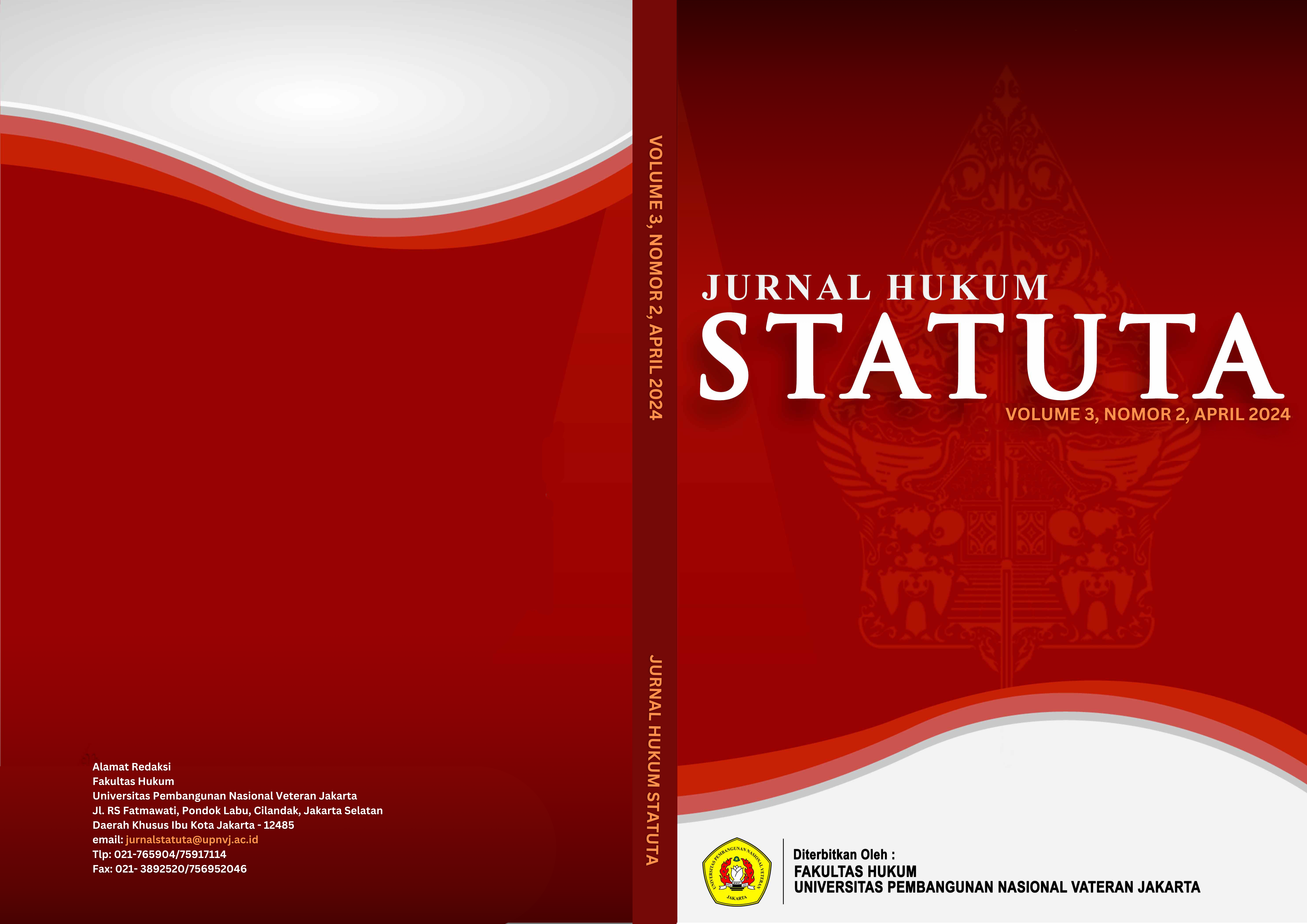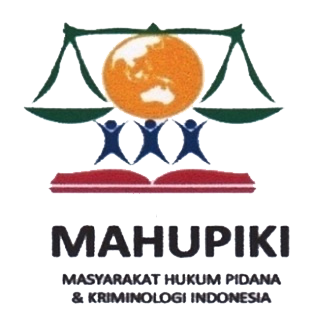Juridical Review of Outsourcing Policy in Indonesia and Implications for Worker Welfare
DOI:
https://doi.org/10.35586/jhs.v3i2.9027Keywords:
Welfare, Outsourcing, WorkersAbstract
The practice of labor deployment by third-party companies is a common occurrence in Indonesia. However, the paradigm surrounding this labor deployment remains legally ambiguous for some members of the public, which affects the welfare of the workers. This ambiguity prompted the author to conduct a study focusing on the juridical review of outsourcing policies and their implications on worker welfare. Based on the author's research, it was found that the general regulations governing labor deployment or outsourcing issues are Law No. 13 of 2003 on Manpower, Law No. 11 of 2020 on Job Creation, and Minister of Manpower Regulation No. 19 of 2012. A common issue faced is the lack of stringent legal oversight. Additionally, outsourced workers often face injustice concerning wages, benefits, and job instability.
References
Buku
Muhaimin, M. (2020). Metode Penelitian Hukum, Mataram-NTB: Mataram.
Saputra, D., Berry, Y., Hamali, S., Gaspersz, V., Syamil, A., Ubud, S., ... & Panudju, A. A. T. (2023). MANAJEMEN OPERASI: Inovasi, Peluang, dan Tantangan Ekonomi Kreatif di Indonesia. PT. Sonpedia Publishing Indonesia.
Jurnal, Skripsi, Tesis, dan Disertasi
Annisa, O. C. N. (2023). Analisis Dampak Peraturan Pemerintah Pengganti Undang-Undang Cipta Kerja Terhadap Hak Pesangon Pemutusan Hubungan Kerja. Journal Equitable, 8(1), 129-143.
Habibi, N., Amrizal, M. D. R., Rozikin, I. S., & Ahmad, I. F. (2024). Memperkuat Perlindungan Pekerja Outsourcing: Analisis Implementasi Kebijakan. Journal of Social Movements, 1(1), 85-97.
Hanipah, A., Dalimunthe, N., Pertiwi, S. I., & Sitompul, H. (2023). Kontrak Kerja dalam Hukum Bisnis Ketenagakerjaan: Analisis Perlindungan Hukum Hak dan Kewajiban Para Tenaga Kerja. Maliyah: Jurnal Hukum Bisnis Islam, 13(1), 110-132.
Haurissa, Y., Salmon, H., & Pattipawae, D. R. (2024). Akibat Hukum Apabila Pekerja Outsourcing Tidak Mendapatkan Perlindungan Hukum. Bacarita Law Journal, 4(2), 84-99.
Hidayati, T., Faqrurrowzi, L., & Tanjung, Y. T. (2022). Analisa Yuridis Pengawasan Manajerial Pekerja Outsourcing Setelah Berlaku Undang-Undang Cipta Kerja. Jurnal Ilmiah Advokasi, 10(2), 132-156.
Kunarti, S. (2009). Perjanjian Pemborongan Pekerjaan (Outsourcing) Dalam Hukum Ketenagakerjaan. Jurnal Dinamika Hukum, 9(1), 67-75.
Kurnia, Y. (2019). Pelaksanaan Perlindungan Kesehatan Dan Keselamatan Kerja Bagi Pekerja Outsourcing Di PT. Transportasi Gas Indonesia (TGI) Regional Office II Kabupaten Indragiri Hulu (Doctoral dissertation, Universitas Islam Riau).
Marchela, S. R. (2023). Akibat dan Perlindungan Hukum pada Pekerja Alih Daya Berdasarkan Undang-Undang Republik Indonesia Nomor 11 Tahun 2020 tentang Cipta Kerja (Doctoral dissertation, Universitas Kristen Indonesia).
Milinum, S. N. (2022). Problematika Fleksibilitas Outsourcing (Alih Daya) Pasca-Undang-Undang Nomor 11 Tahun 2020 tentang Cipta Kerja Klaster Ketenagakerjaan. Jurnal Hukum Lex Generalis, 3(5), 412-432.
Muanam, M., & Saija, R. (2019). Rekonstruksi Kontrak Kerja Outsourcing di Perusahaan. Deepublish.
Nawawi, M. T. (2015). Pengaruh Kepuasan Kerja, Dan Motivasi Kerja Terhadap Kinerja Karyawan/ti Dengan Komitmen Organisasional Sebagai Variabel Intervening (Studi Karyawan Outsourcing PT. J Yang Ditempatkan Di Kampus II Untar Jakarta). Jurnal Manajemen dan Bisnis Indonesia, 3(1), 129-147.
Nuriya, E., Ispriyarso, B., & Cahyaningtyas, I. (2020). Optimalisasi Pengawasan Sistem Outsourcing Sebagai Upaya Menunjang Perlindungan Tenaga Kerja Di Indonesia. Notarius, 13(1), 298-311.
Pamungkas, A. R. (2014). Model Outsourcing Dalam Perspektif Perlindungan Hukum Dan Hak Tenaga Kerja (Studi Kasus CV. Komunika Putera Sentosa Surakarta) (Doctoral dissertation, Universitas Muhammadiyah Surakarta).
Pratista, M. J. (2023). Kajian Hukum Terhadap Peran Perusahaan Outsourcing Dalam Peningkatan Kesejahteraan Tenaga Kerja Di Indonesia. UNES Law Review, 6(2), 7573-7580.
Rahmat, W. F. (2015). Problematika Buruh dalam Menghadapi Sistem Kerja Kontrak dan Outsourcing. Dharma Ekonomi, 17(31).
Rahmawati, M. C. (2011). Mekanisme rekrutan tenaga kerja Outsourcing pada Bank Jabar Banten Syariah (Doctoral dissertation, UIN Sunan Gunung Djati Bandung).
Rannu, D. A., & Rasji, R. (2023). Analisis Hukum Ketenagakerjaan Dalam UU Cipta Kerja. Innovative: Journal Of Social Science Research, 3(5), 564-570.
Sinambela, S. M., Ningsih, P. W., Aridho, A., Lumbantobing, J. N. Y., Simbolon, N. A., Sinaga, R. S., ... & Ibrahim, M. (2024). Perkembangan dan Dinamika Hukum Ketenagakerjaan di Indonesia. Hakim, 2(1), 25-43.
Sudiarawan, K. A. (2016). Analisis Hukum Terhadap Pelaksanaan Outsourcing Dari Sisi Perusahaan Pengguna Jasa Pekerja. Jurnal Ilmu Sosial Dan Humaniora, 5(2).Sujoko, A. (2018). Menggagas Sistem Pengupahan dan Kesejahteraan Pekerja Outsourcing di Pemerintah dalam Pengadaan Publik. Administrative Law and Governance Journal, 1(4), 436-446.
Sulistyawati, I. (2014). Implementasi Sistem Outsourcing Tenaga Kerja Security Ditinjau Dari Undang-Undang Nomor 13 Tahun 2003 Tentang Ketenagakerjaan Pasca Keluarnya Peraturan Menteri Tenaga Kerja Dan Transmigrasi Republik Indonesia Nomor 19 Tahun 2012 Tentang Syarat-Syarat Peny.
Suyanto, H., & Nugroho, A. A. (2016). Perlindungan Hukum terhadap Hak-hak Pekerja Outsourcing Berdasarkan Asas Keadilan. Jurnal Yuridis, 3(2), 61-74.
Suyoko, M. G., & Az, M. G. (2021). Tinjauan yuridis terhadap sistem alih daya (outsourcing) pada pekerja di Indonesia. Jurnal Cakrawala Hukum, 12(1), 99-109.
Vinahapsari, C. A. (2019). Perbandingan Tingkat Stress Kerja Antara Karyawan Tetap Dan Karyawan Outsourcing Bank Bri Wilayah Yogyakarta. TECHNOBIZ: International Journal of Business, 2(1), 1-6.
Downloads
Published
How to Cite
Issue
Section
License

This work is licensed under a Creative Commons Attribution-ShareAlike 4.0 International License.
Authors who publish with this journal agree to the following terms:
- Authors retain copyright and grant the journal right of first publication with the work simultaneously licensed under a Creative Commons Attribution-ShareAlike 4.0 International License that allows others to share the work with an acknowledgement of the work's authorship and initial publication in this journal.
- Authors are able to enter into separate, additional contractual arrangements for the non-exclusive distribution of the journal's published version of the work (e.g., post it to an institutional repository or publish it in a book), with an acknowledgement of its initial publication in this journal.
- Authors are permitted and encouraged to post their work online (e.g., in institutional repositories or on their website) prior to and during the submission process, as it can lead to productive exchanges, as well as earlier and greater citation of published work (See The Effect of Open Access).
Jurnal Statuta have CC-BY-SA or an equivalent license as the optimal license for the publication, distribution, use, and reuse of scholarly work.
In developing strategy and setting priorities, Jurnal Statuta recognize that free access is better than priced access, libre access is better than free access, and libre under CC-BY-SA or the equivalent is better than libre under more restrictive open licenses. We should achieve what we can when we can. We should not delay achieving free in order to achieve libre, and we should not stop with free when we can achieve libre.
You are free to:
- Share — copy and redistribute the material in any medium or format
- Adapt — remix, transform, and build upon the material for any purpose, even commercially.
The licensor cannot revoke these freedoms as long as you follow the license terms.

Jurnal Statuta licensed under a Creative Commons Attribution-ShareAlike 4.0 International License.











